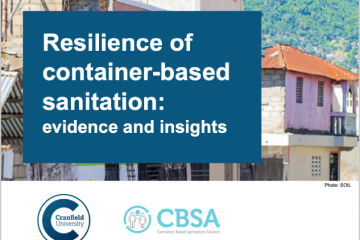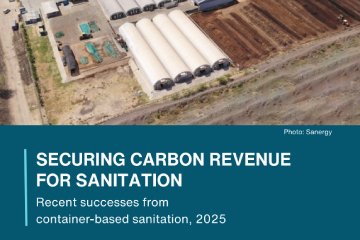Reposted and adapted from Cranfield University’s article by Dr Richard Adams.
On 14 June 2023, Cranfield School of Management, Water & Sanitation for the Urban Poor and the CBSA hosted ‘Flush with Success’, a roundtable to discuss how small and medium-sized social enterprises (SMSE) can help to meet enormous global sanitation challenges.
What’s holding enterprises back, and how can governments, businesses, donors, and academia support them to achieve the scale required? Discussions surfaced on several systemic issues faced by actors in the sanitation sector when trying to achieve scale.
CBSA’s Executive Director, Rémi Kaupp shared some overall reflections after chairing the panel:
For the enterprises, I liked the suggestion of starting with the Government relationships. In sanitation, you can’t do this on your own. You are not going to revolutionise this without engaging from the start with governments.
And you should expect a lot of changes in how the market works and how the customers react.
Then, for the funders, there is a request to be patient, to see the long-term view, to support this long term vision in ventures. And that can include supporting succession plans.
But also, it’s very interesting to help them surface where they add value. Where is the value created? And that can be not where you expect it, as Venu was emphasising. And this value may or may not create revenue. Alison was pointing out how relatively little financial value is created from a circular economy, though it is very very useful.
So in sanitation, we can remember that subsidies are needed, and can be included in how to make ventures viable. But again, that needs good relationships with the government to start with.
And as we have been reminded, it’s hard to have a good, balanced relationship with governments very often in sanitation. There are not that many places where you don’t have that top-down relationship or the very laissez faire attitude, either.
So this will take time to change. Our panel has provided a few examples, especially from the off grid energy sector, and others…it takes time to change, but it is very valuable.
So we have to do very good storytelling on this to show how that can change.
And find a good balance in terms of regulating, ensuring there are good services, ensuring they are inclusive, ensuring that everybody is served. But letting innovators add their value, add their creativity, their effectiveness, etc.
That came together for me in the mention of the results-based financing. For example, more generally, what are the metrics of success? And we’ve got different ones – between government, between funders, between entrepreneurs. Where can we find the right alignments? In terms of customer satisfaction, or in terms of the Triple Bottom Line, also mentioned earlier. Lots of focuses here on creating goods, accountability, good regulation, good relationships – but it’s possible.
I think there will be a lot to learn from all of you for future discussion, hopefully. I hope to make it happen. And I hope I can play a role in this as well.
Dr Richard Adams summarised the following key messages:
Delivering services and testing models
- Sanitation SMSEs need a precise customer value proposition to succeed.
- Intelligent, innovative business models reveal and deliver more value.
- SMSE sanitation assets need manageable financing.
- Private and public sector resourcing of SMSEs must be balanced to deliver safe, sustainable sanitation.
- Context-specific, sustainable SMSE business models balance service quality and social goals.
Developing capacity in the public and private sector
- Training for SMSEs, governments, corporates, and individuals is needed.
- Sector supporters invest in sustainable SMSE development.
- Cross sector partnerships support scaling up of the sanitation sector.
Influencing and technical assistance
- Focus attention on sustainable business strategies.
- Promote long-term, trust-based relationships enhancing SMSE adaptability.
Mobilising resources for the WASH sector
- “Patient” finance requires understanding of complexities, builds relationships of trust, delivers sustainable sanitation.
- Revenue / results-based financing requires measures of success accepted by government, funders, entrepreneurs.
- More / diverse investment required for different SMSE growth stages.
Carrying out research and producing evidence
- Scaling social ventures requires focus on broader ecosystem in which individual firms operate.
- Diverse revenue generation models needed to monetize value creation: circular economy, customer revenue, government contracts.
- Water utilities face challenges in taking on sanitation responsibilities.
Read a full write up of the discussion by Cranfield University
Event details
The ‘Flush with Success’ roundtable brought together more than 50 global sanitation experts, social entrepreneurs and researchers to share experiences of supporting a growth approach to addressing global WASH (Water, Sanitation and Hygiene) challenges. WASH-focused Small and Medium-Sized Social Enterprises need a precise customer value proposition to succeed. Balancing service quality and social goals, and private and public funding, can be complex. Social entrepreneurs need to be supported by and work with governments and international and local agencies to develop viable business and financing models.


